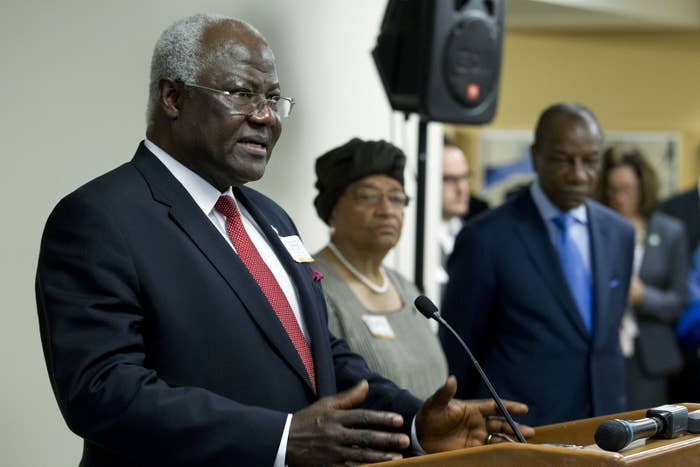
CORRECTION
Corrects Sierra Leone's maternal mortality numbers, as a ratio of reproductive age deaths.
Sierra Leone President Ernest Koroma is expected to sign a bill legalizing abortion, after declaring the country's maternal health crisis a "national emergency" in a speech to Parliament on Friday.
The country has one of the highest rates of maternal death in the world: in 2015, 21% of deaths of women and girls ages 15-49 were due to complications from childbirth.
The Safe Abortion Act, which the country's parliament passed on December 8, allows for unrestricted abortion in the first 12 weeks; girls under age 18 require the permission of a guardian, according to Reuters. It will come into force January 1, provided the president signs the bill.
"In Sierra Leone, nobody can tell me they have not been
affected by death from unsafe abortion in one way or another. Either a friend,
member of your family... [or] someone on your street
may have died of unsafe abortion," Valerie Tucker, country director for Ipas, an international sexual and reproductive health organization, told BuzzFeed News by telephone.
A 2013 Ipas study of post-abortion care in hospitals found that 10% of maternal deaths in Sierra Leone's hospitals were due to unsafe abortions. Medical interventions to save the lives of women at risk from unsafe abortions cost the government more than $230,000, the report said. Ipas expects legalizing abortion will cut those costs by more than half.
The new law comes just five months after Sierra Leone ratified the Maputo Protocol, an African women's rights charter. Sierra Leone's Parliament said in a statement that its status as a protocol signatory is what pushed the bill, which has been debated for three years, past "huge challenges" and into law.
But local reproductive health specialists say the bill's success is actually thanks in large part to the Ebola crisis.
"The crisis was a game changer for women in Sierra Leone," Tucker said. "we didn’t really realize how bad things were until Ebola came and exposed a lot of issues."
Ufuoma Omo-Obi, country director of Marie Stopes, an international family planning and reproductive health provider, agreed. "There was a conversation around the numbe rof people who were refused services because of Ebola, and the increasing maternal deaths in the country as result of people losing confidence in the health system, from the loss of health workers and so on and so forth," he said.
Omo-Obi said the bill was also good news for health providers, especially at Marie Stopes, who were under tight scrutiny to ensure they were not providing abortion services against the law. The organization did not, in fact, provide abortion but loudly offered post-abortion care for women with complications from unsafe procedures, he said.
"Our providers [were] scared about who was really genuinely being there to seek services," and who was posing as a member of an anti-abortion group or the police to try and trap the providers, "and there was the challenge of our clients being harassed by the police and by law enforcement agents. Even if there were cases almost gone bad, a couple times our team members hounded into police cells… and we had to convince them that service being provided according to the law," Omo-Obi said.
Health specialists expect age restrictions on abortion will be felt by many of the people in need of the service. A 2013 UNICEF report found that 68% of sexually active teenage girls in Sierra Leone had been pregnant. The law would only allow those girls access to abortion with permission, given in person, by a parent or guardian.
That particular demand, Tucker said, came directly from women's groups.
"They said if their children were sexually active, they would want to know, and would want to know how to prevent future pregnancies," Tucker said. "Don’t forget in Sierra Leone, it’s a place where you don’t talk about sexual health to your kids. Change is a process."
Omo-Obi hopes Sierra Leone's new bill can be a model for the region. Sierra Leone shows "it's possible for countries to stop playing the ostrich" — that is, to get their head out of the sand — "and begin to respond to needs of their people. These numbers are hard numbers, real numbers — and these they are real women, married mothers with kids. We need to ensure that we stop preventable deaths related to unsafe abortions that happen within the region."
